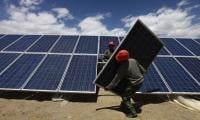PESHAWAR/ISLAMABAD: In a major development, American forces Friday vacated the Bagram Airbase — their main military base in Afghanistan — that once housed 100,000 troops to fight al-Qaeda and Taliban.
Some US troops are still in Kabul, and if they are pulled out, it would bring an end to the longest war in the US history. Though some more US troops have yet to withdraw from another base in Kabul, Bagram pullout brings an end to the United States longest war in its history on a foreign land.
Taliban confirmed that the US forces had vacated the airbase and handed it over to the Afghan security forces. The Taliban, however, said they didn’t have an immediate plan to capture the Bagram Airbase.
“We consider evacuation of all US forces from Bagram a positive step and seek withdrawal of foreign forces from all parts of the country. This is in the interest of both American and Afghan nations,” Taliban spokesman Zabihullah Mujahid stated in a reaction to the US troops' withdrawal from their main military base.
Besides a military base, the CIA ran a detention centre called “black site” at Bagram where hardcore militants were held. It was stated to be worse than the infamous Guantanamo Bay prison among the Taliban prisoners.
It was reportedly shut in 2014 when human rights groups raised their voice against torture of prisoners. Bagram Airbase was built by the now-defunct Soviet Union in Parwan province, but the Americans later developed it into a sprawling base, having a hospital and two runways. US presidents used to land and fly from this base.
According to the Taliban, they were intimated by the US officials that they would vacate the military base in three days. The Taliban spokesman said their current strategy was to get hold of rural areas and seize government and military installations outside the cities.
In Parwan where the Bagram Airbase is located, the Taliban claimed they were a few kilometers away from the military base but would not advance unless their top leadership made a decision.
“We are celebrating the evacuation of the US troops from Bagram, as it was their main military base and their fighter jets would fly from there to pound our positions across Afghanistan,” one Taliban commander in Ghazni province told The News.
He said all the American troops and Nato forces had left the Bagram Airbase, but some of US soldiers were still at their embassy in Kabul. “This is the beginning but they had a commitment with us that all their troops would leave Afghanistan by the end of September 2021,” the Taliban commander said. A section of foreign media quoted some senior Afghan government officials, saying the Americans had left the airbase overnight without coordination with them.
The US had toppled the Taliban government in 2001 accusing them of sheltering Osama bin Laden, the founder of al-Qaeda and the mastermind of 9/11 attacks. The US-led international mission was once full of promise, with armies and governments from around the world coming together in the wake of attack on the United States and pledging a brighter future for the war-torn country.
After 20 years of war, suffering from human losses and spending billions of dollars in civilian and military aid, they could neither defeat Taliban nor developed Afghanistan. America has lost 2,300 troops in their longest war in a foreign country. According to reports, more than 100,000 Afghans are stated to have been killed or injured in the Afghan conflict.
Mariana Babar adds: After 20 years, the last of US and Nato forces finally left the Bagram Airbase, with uncertainty gripping the landlocked country and the region as a whole. While Pakistan has been working on several work plans, no one knows for sure what the fallout will be and if any of these plans will work.
A timely and well researched report by the International Crisis Group (ICG) “Pakistan: Shoring up Afghanistan’s Peace Process”, may just have the answers. Overcoming decades of suspicion and ill will in Kabul will also require Pakistan to stop treating Afghanistan as a Pakistani protectorate and abandon “an approach that has for far too long focused on cultivating Afghan proxies”. If the Afghan conflict continues, Pakistan, sitting right next door, stands to lose more than any country but Afghanistan itself.
There is concern amongst the Pakistani military leaders that indefinite stalled negotiations would heighten tensions with Kabul and might harm Islamabad’s relations with Washington. So it is in Pakistan’s interest to persuade, using pressure if need be, the Taliban shura to break the logjam in the peace talks by reducing violence and moderating demands for Islamic, likely Sunni Deobandi, governance.
“Pakistan’s policymakers should act now or else it might be too late. They should pressure the Taliban leadership to reduce violence and work with other Afghan stakeholders in reaching a political settlement. As an early step, they should push the Taliban to publish a detailed political vision subject to both scrutiny and the push-and-pull of negotiations. In tandem, they should make an equally earnest effort to pressure and persuade the Afghan Taliban to sever their ties with anti-Pakistan militants,” notes the ICG.
In this regard, the report also points to China, Pakistan’s closest foreign partner saying that Beijing also probably prefers that Islamabad work to produce a more stable outcome than a Taliban victory followed by an attempt at monopolistic rule.
“A failed peace process could spark all-out civil war in Afghanistan and a massive influx of refugees into the Pakistani territory,” says the report. Violence in Afghanistan would also spill over into Pakistan, destabilising its conflict-prone western border as Taliban gains empower the Afghan insurgents’ Pakistani Deobandi militant allies.
Sending a warning shot, the ICG warns that in the worst-case scenario, a Taliban military takeover in Kabul, Pakistan would face the dilemma of dealing with its ally heading a regime that would enjoy scant outside backing and – crucially – very little financial aid. So has the time come for Pakistan to make a final decision on how to deal with the Taliban?
“Up to now, Pakistan has managed to cajole the Taliban to occasionally join talks and to demonstrate interest in a peace process without turning the screws on the leadership and risking a breach in the relationship. In light of the US and NATO withdrawal, the time may be fast approaching when push comes to shove and Pakistan no longer can balance pursuing its preference for a negotiated settlement with its preference for a moderated approach to pressuring the Taliban,” says the ICG. It also points to several facts which are being heard in Pakistan itself.
Should the Afghan peace process continue to sputter or altogether fail, warns the report, Islamabad’s relations with Kabul and Washington would sour. Further instability or Taliban gains in Afghanistan could embolden Pakistani militants aligned with their Afghan counterparts, deepening insecurity in Pakistan, especially in its tribal areas along the Afghan border.
However, if there is any progress in the peace talks, this would also improve relations with Kabul, in turn addressing another Pakistani concern that about India’s role as a spoiler of Pakistan’s interests in Afghanistan.
“At the same time, other governments in the region should also pressure the Taliban, for example through travel restrictions, until they demonstrate willingness to participate meaningfully in the Doha peace process”, adds the report.
An expert with extensive knowledge of the relationship said Pakistan’s influence has changed, rather than diminished. For instance, Pakistan no longer provides weapons directly to the Taliban but allows the movement to import the arms it purchases freely through Pakistani territory. Emphasising that Taliban sanctuaries in particular remain a major bargaining chip for Pakistan in its dealings with the Taliban, the expert said: “That clout can be used to shape Taliban behaviour”.
The Taliban shura is unlikely to relocate to Afghanistan in the foreseeable future. So long as this council needs Pakistani sanctuaries and support, a former senior military officer said, Pakistan will “retain leverage over the Taliban”. He said, “We are giving the leadership and their families security and safety”.
For Pakistan, of importance is the continued safe havens being provided to the TTP inside Afghanistan. Despite Pakistani demands, the Afghan Taliban have yet to deny Pakistani Taliban militants shelter or to dissuade their fellow militants from using territory they control to attack Pakistani forces.
A former senior Pakistani diplomat with close links to several Pakistani institutions, including military and governments, disclosed to the ICG, “The Pakistan military has tried but has failed to convince the Taliban leadership to distance itself from the Pakistani Taliban”. On the contrary, Pakistani Taliban splinter groups, based mainly in Taliban-controlled territory, have rejoined the TTP, enhancing that group’s ability to attack Pakistani forces.
A Pakistani newspaper editorial that decried TTP “safe havens” in Afghanistan called on Islamabad to “exercise its leverage with the Afghan Taliban and let them know that allowing the TTP or other anti-Pakistan groups to use space under their control will not be tolerated”.
If the Taliban increases its military footprint on the ground, its prowess may further embolden Pakistani militants. A retired general said: “The space for the Taliban’s natural allies – Pashtun militants and Sunni sectarian outfits – is already expanding in Afghanistan. Those risks would increase even further if Kabul were to fall to the Taliban”.
A former senior counter-terrorism official likewise warned: “Pakistani sectarian and other militants will be the ultimate beneficiaries of Taliban state capture. Instead of being a strategic asset, the Taliban will become a strategic threat to Pakistan”.
International media reports: Looters rolled in as soon as the US military left its biggest airbase in Afghanistan. The airbase was ransacked within hours of the withdrawal. The looters stole laptops and gas canisters from the base, said Darwaish Raufi, a district administrator for Bagram, per the New York Times.
Raufi said the US withdrawal was done overnight and not in coordination with local officials. "Unfortunately the Americans left without any coordination with Bagram district officials or the governor's office," Raufi said.
"Right now our Afghan security forces are in control both inside and outside of the base." The looters were "stopped and some have been arrested and the rest have been cleared from the base," Raufi said.
A local said the looters had also stolen materials like metal and plastic that could be sold as scrap, Stars and Stripes correspondent J.P. Lawrence reported. Typically bases are turned over between military forces when the new troops are able to, at a minimum, secure the perimeter. That the base was so easily ransacked following the US pullout doesn't bode well for Afghanistan's future.
Col. Sonny Leggett, a spokesperson for the US-led coalition in Afghanistan, pushed back against the notion that the US wasn't in contact with local officials about the withdrawal. Leggett told the Times the pullout was "closely coordinated."
The government has returned the services of BS-20 officer of Information Service Shafqat Abbas to the Ministry of...
Previously, the prime minister had given four days to the committee to fix responsibily for the import of wheat
The petitioner stated that the electoral body had no authority to interpret the constitution
CM was briefed that in first phase, 12 schools for special children would be completely revamped this year
Anti-Corruption Establishment filed appeals against 58 sentences handed down by the courts from January 1, 2018 to...
These statistics reflect that on an average, 700,000 youngsters add up to the total number of out-of-school children...







